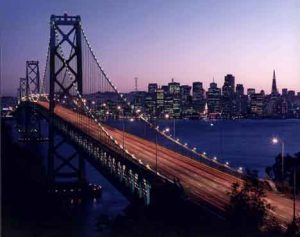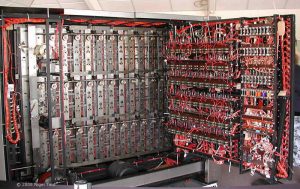So this post, isn’t for a full project, simply for a research assignment. Over the winter break we were told to read Little Brother by Cory Doctorow. Oh great, another school assigned book, how great could it possibly be? To my surprise, it’s actually one of my favourite books to date.
The novel is about four teenagers in San Francisco who, in the aftermath of a terrorist attack on the San Francisco–Oakland Bay Bridge and BART system, defend  themselves against the Department of Homeland Security’s attacks on the Bill of Rights. Marcus Yallow is the main protagonist, a tech savvy 17 year old who creates an encrypted internet system that runs through Xbox consoles. This allows him, his friends, and anyone else who disagrees with the government’s new security measures of tracking every movement, phone call, keyboard tap, and mouse click of everyone in San Francisco, can communicate out of the eyes of the DHS and governing system.
themselves against the Department of Homeland Security’s attacks on the Bill of Rights. Marcus Yallow is the main protagonist, a tech savvy 17 year old who creates an encrypted internet system that runs through Xbox consoles. This allows him, his friends, and anyone else who disagrees with the government’s new security measures of tracking every movement, phone call, keyboard tap, and mouse click of everyone in San Francisco, can communicate out of the eyes of the DHS and governing system.
Due to his passion for technology, Marcus’ all time hero is Alan Turing, who is most well known for his work in WW2 when he created what was pretty much the first version of computers as we know them today. Resulting in the deciphering of the Nazi enigma codes and the Allies to come out as the winner.
This incredible man is who I chose to research, so here’s a brief (yes, this is brief..) report on what I’ve found. If you find this little bit of information fascinating I highly recommend the movie “The Imitation Game” starring Benedict Cumberbatch.
Alan Turing
English scientist Alan Turing was born Alan Mathison Turing on June 23, 1912, in Maida Vale, London, England. At a young age, he displayed signs of high intelligence,  which some of his teachers recognized, but did not necessarily respect. When Turing attended the well-known independent Sherborne School at the age of 13, he became particularly interested in math and science.
which some of his teachers recognized, but did not necessarily respect. When Turing attended the well-known independent Sherborne School at the age of 13, he became particularly interested in math and science.
In 1936, Turing delivered a paper, “On Computable Numbers, with an Application to the Entscheidungsproblem,” in which he presented the notion of a universal machine (later called the “Universal Turing Machine,” and then the “Turing machine”) capable of computing anything that is computable: The central concept of the modern computer was based on Turing’s paper.
Over the next two years, Turing studied mathematics and cryptology at the Institute for Advanced Study in Princeton, New Jersey. After receiving his Ph.D. from Princeton University in 1938, he returned to Cambridge, and then took a part-time position with the Government Code and Cipher School, a British code-breaking organization.
During World War II, Turing was a leading participant in wartime code-breaking,

particularly that of German ciphers. He worked at Bletchley Park, the GCCS wartime station, where he made five major advances in the field of cryptanalysis, including specifying the bombe, an electromechanical device used to help decipher German Enigma encrypted signals.
Homosexuality was illegal in the United Kingdom in the early 1950s, so when Turing admitted to police—who he called to his house after a break-in—in January, 1952, that he had had a sexual relationship with the perpetrator, 19-year-old Arnold Murray, he was charged with gross indecency. Following his arrest, Turing was forced to choose between temporary probation on the condition that he receive hormonal treatment for libido reduction, or imprisonment. He chose the former, and soon underwent chemical  castration through injections of a synthetic estrogen hormone for a year, pushing him to his limits and eventually over the edge. Turing died on June 7th, 1954. The autopsy reported that “four ounces of fluid which smelled strongly of bitter almonds, as does a solution of cyanide” was found in the stomach. Trace smell of bitter almonds was also reported in vital organs. The autopsy concluded that the cause of death was asphyxia due to cyanide poisoning and ruled a suicide.
castration through injections of a synthetic estrogen hormone for a year, pushing him to his limits and eventually over the edge. Turing died on June 7th, 1954. The autopsy reported that “four ounces of fluid which smelled strongly of bitter almonds, as does a solution of cyanide” was found in the stomach. Trace smell of bitter almonds was also reported in vital organs. The autopsy concluded that the cause of death was asphyxia due to cyanide poisoning and ruled a suicide.
Awards and Recognition
Shortly after World War II, Alan Turing was awarded an Order of the British Empire for his work. Turing was honored in a number of other ways, particularly in the city of Manchester, where he worked toward the end of his life. In 1999, Time magazine named him one of its “100 Most Important People of the 20th century,” saying, “The fact remains that everyone who taps at a keyboard, opening a spreadsheet or a word-processing program, is working on an incarnation of a Turing machine.”
Yes, I know that doesn’t seem like it was brief but Turing has done so much more during 
 his time that has a impacted the way we live today. Not only did he invent the first computer of it’s kind, the one that we use in modern society, but he was a man much ahead of his time. Already asking the question, “can machines think?”, before the term ‘Artificial Intelligence’ had even been coined.
his time that has a impacted the way we live today. Not only did he invent the first computer of it’s kind, the one that we use in modern society, but he was a man much ahead of his time. Already asking the question, “can machines think?”, before the term ‘Artificial Intelligence’ had even been coined.
Without him, who knows how long computers would have taken to develop into what they are today. He gave them the power to take multiple sources of information and only dispute what’s needed. In a way he gave computers the power to think for themselves,  allowing us to take a few taps out of the equation, making it easier. In a way this a form of disruption to our everyday way of life, it might not seem like it because it’s all my generation knows. Who knows what sites or pages the server is going through, who or what it has to contact in order to get there? Computers are such normal things nowadays no one really thinks about how they change the way we live. Our schedules, contacts, diet plans, fitness tracking, most of our communication, runs through these machines.
allowing us to take a few taps out of the equation, making it easier. In a way this a form of disruption to our everyday way of life, it might not seem like it because it’s all my generation knows. Who knows what sites or pages the server is going through, who or what it has to contact in order to get there? Computers are such normal things nowadays no one really thinks about how they change the way we live. Our schedules, contacts, diet plans, fitness tracking, most of our communication, runs through these machines.  Whether it’s in the form of a laptop, desktop, or a smart phone, which is pretty much a hand held computer.
Whether it’s in the form of a laptop, desktop, or a smart phone, which is pretty much a hand held computer.
Without Alan Turing, who knows where we’d be today, what I want you to start thinking about now, just as our class has, is how does technology disrupt the way you work? The way you communicate? The way you live?
Be First to Comment